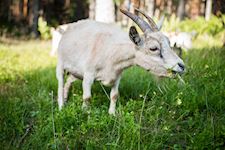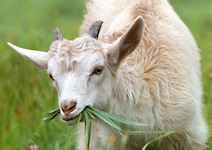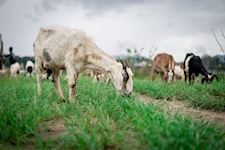Goat Farming - Endorsed Certificate Course (TQUK - Training Qualifications UK)
Distance learning course with study materials, tutor support and final exam included
Academy For Distance Learning
Summary
- Exam(s) / assessment(s) is included in price
- Tutor is available to students
Add to basket or enquire
Overview
Goat Farming Online Course. 100 Hours Endorsed Certificate Course (TQUK - Training Qualifications UK).
Domestic goats are one of the most useful animals to have as they are easy to look after and feed. Therefore, they are very good for farming, as pets, or as pack animals (pack goats).
As a domestic farm animal they can be used to produce a variety of products, such as:
- Diary (milk, butter, yoghurt)
- Meat
- Leather
- Wool (fleece goats)
- Soaps, body and hair care
Goats can also be very useful for the control of weed or grass overgrowth on a property as well as a great source of manure for garden.
Benefits of an ADL Endorsed Course?
Endorsed courses are skills based. They have been evaluated and approved by an independent awarding body such as Training Qualifications UK (TQUK).
What makes ADL’s Endorsed courses different?
- Flexible Self-Paced Learning– adjust your learning around your home and work commitments
- Start and Finish at any time
- Courses globally and industry relevant
- Practical Component at the end of most lessons.
Allocated your own tutor relevant to your subject. You can have as little or as much contact as you like with your tutor. They are there to support you all the way through.
This course is endorsed by TQUK -Training Qualifications UK, an OFQUAL awarding body.
Achievement
Course media
Description
Lesson Structure: Goat Production BAG223
There are 9 lessons:
- Nature and Scope of Goat Production
- Introduction and History
- Biological Terminology
- Uses of Goats and Goat Production
- Goats Breeds Overview
- Introduction to Farm Systems
- Keeping a Buck
- Truths and Myths about Goats
- Goat Psychology
- Social Structure
- Goat Breeds and Breeding
- Dairy Goats
- Saanen
- Toggenburg
- British Alpine
- Anglo-Nubian
- Fleece Goats
- Angoras
- Cashmere
- Meat Goats
- Boer Goats
- Spanish Goats
- Savannas
- Kiko
- Myotonic
- Goat Skin
- Black Bengal
- Garganica
- Pet Goats
- Australian Miniature
- Nigerian Dwarf
- African Pygmy
- Feral Goats
- Selection and Breeding General Objectives
- Reproductive System Anatomy
- Puberty
- Breeding Season
- Flock Mating
- Pen Mating
- Hand Mating
- Reproduction Control Methods
- Synchronisation of Oestrus
- Out of Breeding Season
- Superovulation
- Artificial Insemination
- Genetics and Selection
- Understanding Genes
- Feeds and Nutrition
- Dairy Goats
- Saanen
- Toggenburg
- British Alpine
- Anglo-Nubian
- Fleece Goats
- Angoras
- Cashmere
- Meat Goats
- Boer Goats
- Spanish Goats
- Savannas
- Kiko
- Myotonic
- Goat Skin
- Black Bengal
- Garganica
- Pet Goats
- Australian Miniature
- Nigerian Dwarf
- African Pygmy
- Feral Goats
- Selection and Breeding General Objectives
- Reproductive System Anatomy
- Puberty
- Breeding Season
- Flock Mating
- Pen Mating
- Hand Mating
- Reproduction Control Methods
- Synchronisation of Oestrus
- Out of Breeding Season
- Superovulation
- Artificial Insemination
- Genetics and Selection
- Understanding Genes
- Health Management
- Health Problems
- Ecopathology
- Signs of Good Health
- Bacterial and Viral Diseases
- Clostridial Diseases
- Johne’s Disease (Paratuberculosis)
- Listeriosis
- Soremouth
- Slow viruses
- Parasites
- Accidents, Emergencies and First Aid
- Control of Bleeding
- Tear wounds or lacerations
- Electric Shock
- Snake bites
- Fractures
- Poisoning
- Abortion and Genital Processes
- Chlamidiosis
- Q Fever
- Listeriosis
- Leptospirosis
- Toxoplasmosis
- Ketosis
- Digestive Problems
- Bloat
- Choking
- Acidosis
- Respiratory problems
- White Muscle Diseases
- Pinkeye
- Urinary Calculi
- Mastitis
- Metritis
- Sanitary Policy of Infectious Goats
- Choosing a Vet
- General Husbandry - Housing, Fencing, Grooming
- Space Requirements
- Housing and Fencing
- Grazing and Pasture Management
- Free Range
- Intensive Confinement
- Combination System
- Grazing Methods
- How Much Grazing
- Other Areas That Can Be Utilised For Grazing
- Hoof care
- Disbudding
- Dehorning
- Tattooing
- Vaccination
- Worming
- Grooming and Hair Care
- Kids and Kidding
- Hygiene during delivery
- The delivery
- Parturition/Birth
- Care of a neborn kid
- Early feeding
- Weaning
- Castration
- Dairy Production
- Milk Production
- Lactation Curve
- Quality and Composition
- Compositions of goat's milk
- Protein
- Fat
- Lactose
- Ash
- Vitamins
- Factors of variation
- Breeds and production systems
- Age and lactation number
- Different types of cheese
- Meat and Fibre Production
- Fibre Production
- Mohair
- Annual Management of Angora Flock
- Mohair Production
- Cashmere
- Annual Management of a cashmere flock
- Cashmere Production
- Meat Production
- Management of meat flock
- Slaughter terminology
- Carcass quality and grading
- Leather production
- Goat Farm Management
- On the Farm - Buildings and Structures
- Goat shelters
- Farming production systems
- Keeping records
- Goat Management
- Occupational Health and Safety Legislation
- Farm Safety
- Duty of care (employer and employer duties)
- Lifting and manual handling
- Protective Equipment
- Dealing with chemicals
- Storage and disposal of chemicals
- Handling tools and machinery
- Safety Audit
- Marketing your products
- Advertising your stock
- Where you can sell
Each lesson culminates in an assignment which is submitted to the academy, marked by the academy's tutors and returned to you with feedback, any relevant suggestions, comments, and if necessary, extra reading.
Who is this course for?
Agriculturalists, Farmers, Animal Breeders
Requirements
A pc or laptop with internet connection.
Career path
ADL has helped thousands of people develop their farming and agricultural knowledge and skills. This course is perfect if you're aspiring to become a farmer or if you'd like to further develop your career in farming.
Questions and answers
Do I need to be working with goat’s to take this course?
Answer:Hi Kevin Many thanks for your question. No, you won't be required to work with any live goats, although you'll be keen to do so after you pass the course! The qualification is all completed online via assignments. If you require any additional information please do not hesitate to contact me. Kindest regards Amanda White General Manager
This was helpful.Is this course based on goat husbandry being raised in the uk
Answer:Hi Sandie Many thanks for your question. Yes, it is based upon UK goat farming practices. If you have any other questions please contact our main offices, as unfortunately this REED platform doesn't allow me to post URL's or telephone numbers. If you simply google: "ADL, Academy for Distance Learning", we are the first search result. If you require any additional information please do not hesitate to contact me. Kindest regards Amanda White General Manager
This was helpful.
Reviews
Currently there are no reviews for this course. Be the first to leave a review.
Legal information
This course is advertised on reed.co.uk by the Course Provider, whose terms and conditions apply. Purchases are made directly from the Course Provider, and as such, content and materials are supplied by the Course Provider directly. Reed is acting as agent and not reseller in relation to this course. Reed's only responsibility is to facilitate your payment for the course. It is your responsibility to review and agree to the Course Provider's terms and conditions and satisfy yourself as to the suitability of the course you intend to purchase. Reed will not have any responsibility for the content of the course and/or associated materials.





